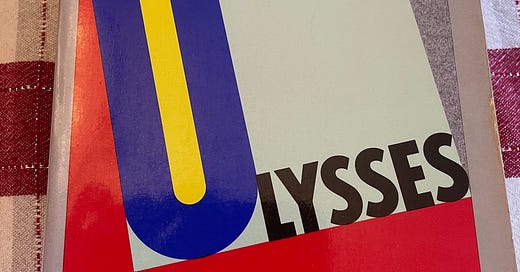The Joy of Reading Ulysses in 2024
I am on spring break right now, something that typically causes me to take on all kinds of ridiculous projects. For example, I am holding a private film festival where I am watching Wes Anderson films paired with movies that influenced them that I haven’t seen yet. I just watched Ernst Lubitsch’s To Be Or Not To Be, and now on to The Grand Budapest Hotel. If you think that sounds pretentious, well, I have already one-upped myself by deciding that this will be the time I actually complete James Joyce’s Ulysses.
This was a book I bought at some point in the mid-1990s at a shopping mall Waldenbooks. I had read and enjoyed Dubliners in high school. Soon after I tackled A Portrait of the Artist as a Young Man. These books were not easy reads, but so far so good. I knew that Ulysses had a reputation for being THE novel of the 20th century. I was intent on reading it and came into the experience a little overconfident. My first time through I think I made it about seventy pages. I tried a couple of other times, only making it about 130 pages based on the notes I see scrawled in my copy.
I was not embarrassed because I knew this was a common experience for people who tried reading this book. I began to wonder how it achieved such a high literary reputation if no one seemed able to complete the damn thing. It sat on my shelf afterward, moving with me to multiple cities and states, waiting to be cracked open once again.
Last weekend I was looking for a big classic tome to tackle while I was on break. I had assumed it would be a doorstop 19th century novel, one of my favorite things to read. Maybe I would finally finish The Count of Monte Cristo or Middlemarch. The problem was that I was not in the mood for the languid storytelling and massive canvases of those big long works. My mind was craving something challenging not only for its length, but for how it was written. With St. Patrick’s Day on my brain, I said “screw it, let me read Ulysses.”
I was lucky to get some advice on reading it from a former master’s student of mine whose tips have been crucial. As of today, I am through the first 9 of 32 “episodes” and don’t feel like slowing down. I am finding a particular joy in reading this book that is driving me through some of the harder patches.
This joy is derived in part from Joyce’s work being an antidote to the world that surrounds me. I like so many others have succumbed to the modern disease of living my mental life online. Not only am I constantly scrolling, texting, commenting, posting and blogging (gulp), I encounter things and think thoughts and my first impulse is to send them out into cyberspace. This online world can be entertaining and sometimes edifying, but most of the time it is phenomenally stupid. It does little to engage my highest thoughts and deepest emotions.
Unlike the constant stream of information that scrolls in front of my eyes, every sentence of Ulysses is freighted with so much meaning and importance. The text demands constant concentration. At times I get so wrapped up in it that I feel like the rest of the outside world has completely disappeared. (This is why I try to read it with my phone nowhere near me and notifications turned off.)
Beyond that, Joyce’s famous “stream of consciousness” approach puts you inside the minds of his characters. Following their stray thoughts and musings reminds me of a time when the boredom of daily life could not be assuaged with some scrolling, and that my mind was far more active back then. The online world has helped reduce boredom, but it has hobbled my introspection as well. I am such an addict at this point that I doubt my mind will ever go back to what it once was, but at least when I am reading Ulysses, I can get there for for awhile. (After all, I am writing about this online and posting it to my social media accounts!)
Reading this novel also gives me hope in an era when the techbros cheer the ability of AI to replace human-crafted writing with their poor imitation. Yes, AI can replicate the stale banalities of an office memo or official email, but never could it create something like what Joyce has written. His magnum opus is a reminder of the inspiring heights that one human mind can reach, heights computers can still only dream of (if they were even capable of dreaming.)
Most of all, Ulysses is a testament to the infinite possibilities contained within each human mind on the most mundane of single days on the calendar. There is an entire universe in the thoughts of Stephen Daedalus and Leopold Bloom as they go about their daily routines on a day no more special than any other. We all contain multitudes within ourselves, and each and every day is an opportunity to explore the whole range of our thoughts and emotions. Modern life does not have to be so dull and lifeless and you don’t have to travel anywhere to see something new, just be willing to look at your old surroundings with new eyes. I don’t want to make any guarantees that might embarrass me, but this time I think I’m finishing Ulysses.



